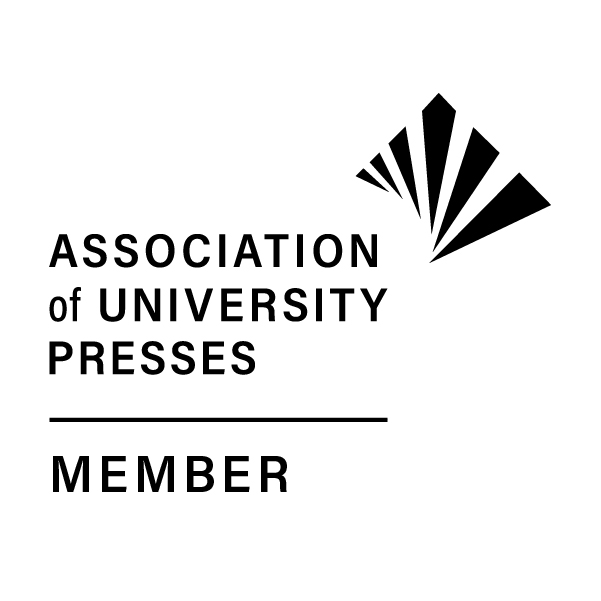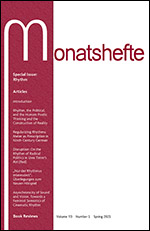|


|

Subscribe
Read the Journal Online
Submission Guidelines
Editorial Board
Receive Email Updates
Advertise in Monatshefte
Indexes/Abstracts
Current Issue TOC
Back Issues TOC
Monatshefte 2022 Subscription Rates
Institutions:
print & online $271
online only $233
Individuals:
print & online $103
online only $86
Non U.S. Postage (no postage charges for online-only subscriptions)
Airmail: add $40/yr.
Canadian Subscribers: add 5% GST. |
Monatshefte
Volume 95, Number 3, Fall 2003 Table of Contents
(Re)Readings—New Readings / Widergelesen—Neu Gelesen
Lucien Goldmann, Pour une sociologie du roman (1964)/Soziologie des Romans (1970)
Renate Werner, Lucien Goldmann, Pour une sociologie du roman
Christian Helmreich, Lucien Goldmanns paradoxale Soziologie des Romans
It was in the late sixties and early seventies of the past century that the conception of a new sociology of literature pioneered by the unorthodox Marxist Lucien Goldmann was introduced into literary scholarship in Germany. Issues 49/50 (1966) and 71 (1970) of the very influential periodical alternative presented the new ideas on a very high intellectual level and within the context of the then current innovation of structuralism. Both issues of alternative (and later the books Soziologie des Romans and Le dieu caché [The hidden God]) were discussed emphatically in seminars and other courses at German universities. Within the framework of literary scholarship Goldmann seemed to offer a way to define the relationship between literature, literary scholarship, and society. The increasingly uncomfortable ivory tower reputation of literary scholarship was brought into fruitful contact with the impulse towards social change, while managing to elude the dichotomies of the Cold War. (HA. In German)
Articles
Priscilla Hayden-Roy
Refining the Metaphor in Lessing’s Erziehung des Menschengeschlechts
Abstract:
In the first 53 paragraphs of the Erziehung des Menschengeschlechts (appended to Lessing’s fourth Gegensatz, written in response to Reimarus’ fourth Fragment) Lessing employs a hermeneutical model which allows for new interpretations to be drawn from the Biblical text over time, in distinction to Reimarus’ static model, but at the same time agrees with Reimarus that interpretations which project more into the words than they can contain, are to be rejected. Both the flexibility and the restrictions characteristic of Lessing’s hermeneutical model derive from the philosophical context informing the Erziehung des Menschengeschlechts, the Wolffian notion of cognitive progression from sensate to rational representations. The nature of the Biblical “primer,” with its historical accounts and poetic language, facilitates this progression: over time the metaphorical language of the Bible is “refined,” revealing the rational truth beneath the sensate cloak. (P. H.-R.)
Axel Spree
Cassirers Baumgarten
Abstract:
The article investigates Ernst Cassirer’s reading of Alexander Gottlieb Baumgarten against the backdrop of present discussions of Baumgartens Aesthetica, focusing on Cassirers account of the concept of “extensive clarity.” Firstly, Baumgarten’s introduction of this concept to the rationalistic system of degrees of knowledge is shown to be his specific achievement in the fields of aesthetics. Only through this specific form of perfection, aesthetics as a science of the “inferior faculties” of knowledge could be justified in rationalistic terms. Secondly, Cassirer’s presentation of Baumgarten’s philosophy in his Freiheit und Form, The Philosophy of the Enlightenment, and in Essay on Man is examined. It is argued that Cassirer neglects this specific achievement of Baumgarten, presenting him merely as a preliminary stage on the way to Kant’s aesthetics. Therefore, strong assertions of a resemblance between the theories of Cassirer and Baumgarten (which can be found in present philosophical discussions) have to be rejected. (AS. In German)
Seraina Plotke
Der ästhetische Trost
Abstract:
This essay will show the extent to which the aesthetic writings of Karl Philipp Moritz can be read as an answer to the question of meaning in existence—a question that required a radically new answer after the dismantling of dogmatic metaphysical systems at the end of the 18th century. In a close reading of his three main works, “Versuch einer Vereinigung [. . .],” “Die metaphysische Schönheitslinie,” and Über die bildende Nachahmung des Schönen, the essay describes the role Moritz attributed to the artist and art in the search for significance in the world and in human existence. Moritz sees the beautiful work of art as a reflection of perfection in the world: In its availability to the human senses as a “world in miniature,” the work of art, one might say, gives the individual visual access to that great perfection which, since the Enlightenment, had been accessible in no other way. Through his paradoxical creation of the infinite made finite—i.e. available to the senses—the artist provides every individual with the possibility of a perspective analogous to God’s. (SP) (In German)
Linde Katritzky
Decoding Anonymous Texts: The Case of the Nightwatches of Bonaventura
Abstract:
Where authorial guidance is lacking, comparison with other works of a similar nature must establish dependable literary criteria. For the anonymous Nachtwachen. Von Bonaventura (1804) this method presents special difficulties. The text does not conform to the conventions of German literature and consists predominantly of seemingly disjointed reflections and observations of an intellectual nightwatchman, calling himself Kreuzgang or Kreuzweg. So the first question should be: who, then, is Bonaventura? Once the allegoric significance of these names is recognized, the philosophic concern with general and universal human problems becomes apparent which belongs to the menippea, a satiric sub-genre focussed on ideas, and conscious of the tragicomic incompatibility of human aspirations and achievements. Its generic characteristics as described by Northrop Frye and Mikhail Bakhtin confirm the Nachtwachen as a menippea of exceptional depth and erudition in the tradition of English Enlightenment satire, worthy to be compared with the best produced in this genre. (LK)
Ursula Mahlendorf
Trauma Narrated, Read, and Misunderstood: Bernhard Schlink’s The Reader: “. . .irrevocably complicit in their crimes. . .”
Abstract:
This article explores the bonds, conflicts and ambivalences the Post-WWII generation experiences with Holocaust perpetrators and by-standers by an analysis of Bernhard Schlink’s fictional autobiography The Reader (1995). Using object relations psychoanalysis and psychoanalytic trauma theory, the essay’s first part examines the adolescent protagonist’s family and sexual relationships. Understanding the protagonist’s autobiographical narrative as representative of a Post-WWII generational experience, the essay demonstrates the traumatization of a member of this generation by the power mis/abuses and the silence of the preceding generation and traces the consequences of the traumatization through the protagonist’s life history. The essay’s second part reviews the history of German Holocaust representation and reception in view of the traumatization and silence of the succeeding generations. It places the extraordinary success of Schlink’s novel in that historical framework and examines the work’s suitability for teaching the Holocaust in the contemporary German school system. (UM)
Book Reviews
Anderegg, Johannes, Schreibe mir oft! Das Medium Brief von 1750–1830 (Gerhard Sauder)
Blickle, Peter, Heimat: A Critical Theory of the German Idea of Homeland (Christopher J. Wickham)
Böldl, Klaus, Der Mythos der Edda. Nordische Mythologie zwischen europäischer Aufklärung und nationaler Romantik (Wulf Koepke)
Cooke, Paul, Speaking the Taboo: A study of the work of Wolfgang Hilbig (Gert Niers)
Fried, Michael, Menzel’s Realism: Art and Embodiment in Nineteenth-Century Berlin (Jost Hermand)
Gerstenberger, Katharina, Truth to Tell: German Women’s Autobiographies and Turn-of-the-Century Culture (Katharina von Hammerstein)
Hachmeister, Gretchen L., Italy in the German Literary Imagination: Goethe’s Italian Journey and Its Reception by Eichendorff, Platen, and Heine (Martina Kolb)
Hinderer, Walter, Hrsg., Goethe und das Zeitalter der Romantik (Gerhart Hoffmeister)
Huber, Christoph, Gottfried von Straßburg: Tristan (Mark Dreisonstok)
Kerry, Paul E., Enlightenment Thought in the Writings of Goethe: A Contribution to the History of Ideas (Peter Boerner)
Koopmann, Helmut und Michael Perraudin, Hrsg., Formen der Wirklichkeitserfassung nach 1848 (Jeffrey L. Sammons)
Mauser, Wolfram, Konzepte aufgeklärter Lebensführung—Literarische Kultur im frühmodernen Deutschland (Robert Jamison)
McCort, Dennis, Going Beyond the Pairs: The Coincidence of Opposites in German Romanticism, Zen, and Deconstruction (Raimund Belgardt)
Müller, Jan-Dirk, Das Nibelungenlied (Mark Dreisonstok)
Nelles, Jürgen, Bücher über Bücher. Das Medium Buch in Romanen des 18. und 19. Jahrhunderts (Ralf-Rainer Wuthenow)
Orosz, Magdolna, Identität, Differenz, Ambivalenz: Erzählstrukturen und Erzählstrategien bei E.T.A. Hoffmann (Dennis McCort)
Ottman, Henning, Hrsg., Nietzsche-Handbuch (Ivan Soll)
Poppenhusen, Astrid, Durchkreuzung der Tropen. Paul Celans ‘Die Niemandrose’ im Lichte der traditionellen Metaphorologie und ihrer Dekonstruktion (Michael Lackey)
Sandford, John, ed., Encyclopedia of Contemporary German Culture (Richard J. Rundell)
Siemes, Isabelle, Die Prostituierte in der literarischen Moderne: 1890–1933 (Joseph Metz)
Steinmetz, Ralf-Henning, Exempel und Auslegung. Studien zu den Sieben weisen Meistern (Salvatore Calomino)
Tantillo, Astrida Orle, The Will to Create: Goethe’s Philosophy of Nature (Benedikt Jeßing)
Vahsen, Mechthilde, Die Politisierung des weiblichen Subjekts. Deutsche Romanautorinnen und die Französische Revolution 1790–1820 (Katrin Komm)
Vazsonyi, Nicholas, ed., Searching for Common Ground. Diskurse zur deutschen Identität 1750–1871 (Arne Koch)
Weinrich, Harald, Sprache, das heißt Sprachen (Anja Wanner)
|


